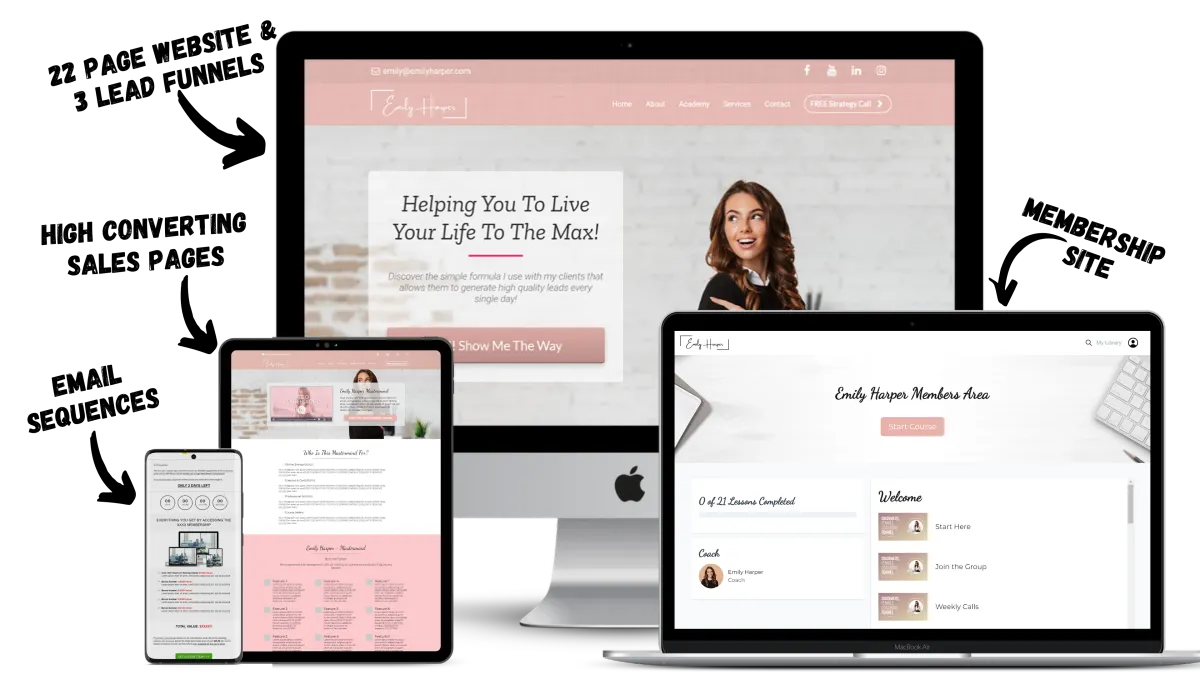
Pricing Your Coaching Services: How to Charge What You're Worth and Attract High-Paying Clients
As a new online coach, you're stepping into a world where passion meets business, and the challenge of pricing your services is one of the first hurdles you'll encounter. It’s easy to feel overwhelmed, especially in your first year when everything from building an online presence to understanding marketing strategies is brand new. However, setting the right price for your coaching services is crucial not just for covering your costs, but for affirming your value, attracting the right clients, and ensuring the long-term sustainability of your business.
Understanding Your Value as a Coach
The foundation of any effective pricing strategy lies in understanding your value as a coach. This begins with identifying your Unique Selling Proposition (USP). Your USP is what sets you apart from other coaches—it’s a combination of your skills, experiences, and the specific results you help your clients achieve. For instance, you might specialize in helping entrepreneurs scale their businesses, or perhaps you guide individuals through significant life transitions. Whatever your niche, recognizing what makes you unique is essential in positioning yourself effectively in the market.
Assessing your experience and expertise is another key component of determining your value. Even if you’re new to coaching, you likely have a wealth of experiences from previous careers, personal growth journeys, or training that contribute to your ability to deliver meaningful results. Reflect on these qualifications and achievements, as they will be instrumental in justifying the prices you set.
Moreover, client outcomes and success stories are powerful tools for establishing your value. These stories provide tangible proof that your coaching services lead to real, positive changes in your clients' lives. As you start working with clients, even in your first year, focus on documenting these early successes. Testimonials and case studies that highlight your clients’ transformations will not only build your credibility but also support your pricing decisions.
Market Research: Knowing the Industry Standards
To price your coaching services effectively, it’s important to have a clear understanding of the market. This involves researching what other coaches in your niche and with similar experience levels are charging. While this information serves as a useful benchmark, it’s crucial not to fall into the trap of simply undercutting your competition. Instead, let your pricing reflect the unique value you offer.
Knowing your target audience is equally important. Consider who your ideal clients are—their financial capabilities, their goals, and what they value in a coaching relationship. By aligning your pricing with what these clients are willing to invest in their personal or professional growth, you ensure that you’re attracting the right people who will appreciate and benefit from your services.
Offering different pricing structures, such as hourly rates, packages, or retainer fees, can also help you appeal to a broader audience. Tiered pricing, where clients can choose from basic, standard, or premium packages, is an effective way to cater to different budgets while still maintaining a high-end option for those willing to invest more for exclusive services.
Pricing Strategies
One of the most effective approaches to setting your prices is value-based pricing. This strategy involves pricing your services based on the perceived value to the client rather than the amount of time or effort you invest. Clients are more likely to pay higher prices if they believe your coaching will help them achieve significant results, whether that’s advancing in their careers, improving their personal lives, or reaching specific goals.
For those targeting high-end clients, premium pricing is a strategy worth considering. Positioning your services as a luxury option can attract clients who are looking for exclusivity and personalized attention. This often involves limiting the number of clients you work with or offering bespoke services that justify higher prices. In this context, exclusivity can be a powerful selling point, and clients who seek premium services are often willing to pay more for the assurance that they’re receiving top-tier coaching.
Psychological pricing, where you use tactics like setting prices just below a round number (e.g., $995 instead of $1000), can also influence client perceptions and decisions. Additionally, offering tiered pricing can help guide clients toward choosing the option that provides the most value, often leading them to select the middle or premium tier.
Building Confidence to Charge What You’re Worth
A common challenge for new coaches is overcoming self-doubt and the limiting beliefs that often accompany it. Many coaches, especially those just starting out, struggle with the idea of charging higher rates, fearing that they’re not “good enough” or that clients won’t be willing to pay. However, recognizing your self-worth and the impact your coaching can have on clients’ lives is essential for setting confident, value-driven prices.
Shifting your mindset from seeing coaching as a simple service to viewing it as a transformative experience can also help you justify higher prices. Instead of focusing on the cost, think about the long-term benefits your clients will gain. The more you emphasize the value and transformation you provide, the more comfortable you’ll become with charging what you’re truly worth.
Communicating this value effectively to potential clients is another crucial aspect of building confidence in your pricing. Clearly articulate the benefits and outcomes of your coaching services, and support these claims with testimonials and success stories. When clients understand the value they’re receiving, they’re more likely to see your services as an investment in their future rather than just an expense.
Creating Attractive Coaching Packages
Bundling services into packages is an effective way to increase the perceived value of your offerings. For example, you might create packages that include a set number of coaching sessions, access to exclusive resources, and ongoing support. This not only provides more value to the client but also encourages them to commit to a longer-term relationship with you.
Offering flexible payment options can also make your services more accessible, especially for high-ticket packages. Payment plans or subscription models can reduce the barrier to entry for clients who might hesitate at a large upfront cost. This approach not only makes your services more affordable but also provides a steady income stream for your business.
Incorporating bonuses, such as additional resources or one-on-one sessions, can further enhance the attractiveness of your coaching packages. These extras can serve as incentives for clients to choose higher-tier options, thereby increasing your overall revenue.
Attracting High-Paying Clients
Attracting high-paying clients requires a combination of strong positioning, targeted marketing, and building credibility. Your brand should reflect the quality and exclusivity of your services, starting with a professional online presence. This includes a high-quality website, cohesive branding, and consistent messaging across all platforms that clearly communicates the value you offer.
Targeted marketing is crucial for reaching the right audience. Focus on marketing to a specific niche where clients are likely to value and invest in premium coaching. Whether through content marketing, networking events, or social media, your efforts should be directed toward attracting clients who are not only able to pay higher prices but are also committed to achieving the results your coaching promises.
Building credibility and authority in your niche is another essential component. Sharing your expertise through blogs, webinars, and social media positions you as a knowledgeable and trustworthy coach. Public speaking engagements, guest appearances on podcasts, or contributing to industry publications can also increase your visibility and establish your reputation as an expert in your field.
Handling Pricing Conversations
Discussing pricing with potential clients can be intimidating, but it’s important to approach these conversations with confidence and clarity. Be transparent about your prices and what each package includes, ensuring there are no hidden fees or ambiguous terms that could lead to misunderstandings.
When faced with negotiations, it’s important to maintain your boundaries. If a client pushes back on price, steer the conversation toward the value and outcomes they’ll receive from your coaching. Emphasize the return on investment rather than the cost, and if necessary, offer alternative packages or payment plans that align better with their budget without compromising your rates.
It’s also crucial to be prepared for common objections, such as concerns about affordability or uncertainty about the value of coaching. Address these objections by reinforcing the benefits and providing reassurances, such as a satisfaction guarantee or sharing testimonials from similar clients who have experienced positive results.
Reviewing and Adjusting Your Pricing
As your business grows, so too should your pricing. Regularly reviewing and adjusting your prices ensures that they continue to reflect your evolving expertise and the value you provide. Consider conducting annual price reviews where you take into account factors like increased demand, new qualifications, and shifts in the market.
Testing different pricing strategies can also provide valuable insights into what works best for your business. For example, you might experiment with different package structures or payment models to see what resonates most with your clients. Gathering feedback from clients through surveys can help you understand how your pricing is perceived and whether adjustments are needed.
As you gain more experience and your services become more in demand, don’t be afraid to scale your pricing. Gradual price increases can reflect the growing value of your services and help you maintain a sustainable business model. Additionally, consider introducing higher-end services or exclusive packages that cater to clients willing to pay a premium for enhanced experiences.
Avoiding Common Pricing Mistakes
One of the most common mistakes new coaches make is undervaluing their services. While it might be tempting to set low prices to attract clients, this approach can lead to burnout and attract clients who don’t fully appreciate the value you offer. It’s important to price your services based on the transformation and outcomes you provide, rather than simply trying to compete on price.
Another pitfall to avoid is overcomplicating your pricing structure. Complex pricing can confuse potential clients and create barriers to making a purchase. Aim for simplicity and clarity in your pricing, offering a few well-defined packages that are easy for clients to understand and compare.
Finally, staying informed about industry trends is essential for keeping your pricing competitive and relevant. Regularly researching market conditions and what other coaches in your niche are charging will help you stay ahead of the curve and ensure your pricing reflects current demand and economic conditions.
Case Studies and Examples
To illustrate the impact of effective pricing strategies, consider the example of Coach A, who started with low-priced sessions to build a client base but quickly realized this approach was unsustainable. By shifting to a value-based pricing model and introducing premium packages, Coach A doubled their income and attracted clients who were serious about achieving results.
Similarly, Coach B focused on a niche market of high-level executives and priced their services accordingly. By positioning themselves as a premium coach, they secured long-term contracts with fewer clients, allowing them to focus on delivering exceptional results without the need to constantly chase new business.
These examples highlight how changing your pricing strategy can lead to better client acquisition, higher income, and a more sustainable coaching business.
Conclusion: Empowerment to Charge What You're Worth
Setting the right price for your coaching services is a crucial step in building a successful and sustainable coaching business. It’s about recognizing your value, confidently communicating that value to clients, and ensuring that your prices reflect the transformation you offer. By understanding your worth, conducting thorough market research, and implementing strategic pricing models, you can attract high-paying clients who are ready to invest in their growth.
If you’re ready to take your coaching business to the next level, consider starting your 14-day trial of CoachMatic.app. Our platform provides the tools you need to launch, grow, and scale your online coaching business with confidence.
What challenges have you faced in pricing your coaching services? Share your experiences in the comments below, or join the conversation on social media using #CoachMatic.


